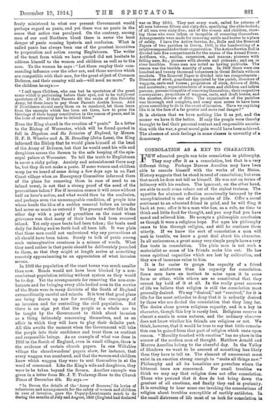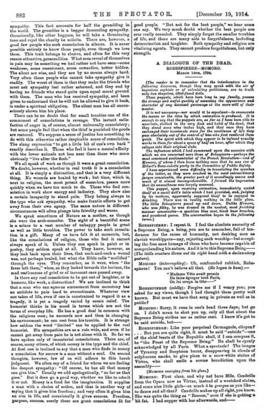CONSOLATION AS A KEY TO CHARACTER.
FEW educated people can take consolation in philosophy. They may offer it as a consolation, but that is a very different thing. Perhaps Marcus Aurelius may have been able to console himself with the works of the Stoics. History suggests that he stood in need of consolation; but even that much he does not tell us himself. He was not on terms of intimacy with his readers. The ignorant, on the other hand, are able to suck some solace out of the stalest truisms. The appetite for abstract reflection occasionally betrayed by the unsophisticated is one of the puzzles of life. Offer a moral sentiment to an educated friend in grief, and he will fling it back at you; offer it to a man who has, as a rule, no time to think and little food for thought, and you may find you have eased and relieved him. He accepts a philosophic conclusion as though it were a religious hope. For ages his philosophy came to him through religion, and still he confuses them utterly. If we know the sort of consolation a man will seek in trouble, we know a great deal about his character. In all seriousness, a great many very simple people have a very fine taste in consolation. The plain man is not such a materialist as some of his friends make him out. He has some spiritual capacities which are lost by cultivation, and they are of immense value to him.
It is far easier to gauge the capacity of a friend to bear misfortune than his capacity for consolation. Some men have an instinct to seize upon it in some form or other, while others are so constituted that they cannot lay hold of it at all. In the really great sorrows of life we believe that religion is still the consolation moat generally desired. We say " desired," not "received," for it is idle for the most orthodox to deny that it is ardently desired by those who are denied the consolation that they long for. The desire alone proves religious capacity, and is a key to character, though this key is rarely lent. Religious reserve is almost a mania in some natures, and the ordinary observer does not know whether his friends are religious or not. We think, however, that it would be true to say that little consola- tion can be gained from that part of religion which rests upon reason. "Morality touched with emotion" has no place in the sorrow of the modern man of thought. Matthew Arnold and Marcus Aurelius belong to the cheerful day. In the Valley of Shadows we want to be assured of something less likely than they have to tell us. The element of amazement must exist in an emotion strong enough to "make all things new." Philosophy and all its banalities are powerless where the bitterest tears are concerned. For small troubles we think we may say that religion does not offer consolation. Those who pretend that it does do but bring down the greatest of all emotions, and finally they end in profanity. It is revolting to hear some one invoking the consolations of religion about troubles susceptible of earthly antidotes. In the small distresses of life most of us look for consolation in
sympathy. This fact accounts for half the grumbling in the world. The grumbler is a beggar demanding sympathy.
Occasionally, like other beggars, he will take a threatening tone and repel the charity he solicits. There are, however, a good few people who seek consolation in silence. It is never possible entirely to know these people, even though we love
them. This trait belongs to elusive, and often for this very reason attractive, personalities. What men reveal of themselves in pain may be something we had rather not have seen—some weakness, some resentment, some cowardice, better hidden. The silent are wise, and they are by no means always hard. Very often these people who cannot take sympathy give it readily. The worst of them is that they make the friends who mast ask- sympathy feel rather ashamed, and they end by having no friends who stand quite upon equal moral ground with them. The man who has received sympathy, and been given to understand that he will not be allowed to give it back, is under a spiritual obligation. The silent man has all uncon- sciously shown him his place.
There can be no doubt that for small troubles one of the commonest of consolations is revenge. The instant satis- faction of anger is, of course, almost universally consolatory ; but some people feel that when the thief is punished the goods are restored. We suppose a sense of justice has something to do with this otherwise rather despicable sense of consolation. The slang expression "to get a little bit of one's own back " exactly describes it. Those who feel it have a mental affinity with the lower animals not less near than those who more obviously "live after the flesh."
We all speak of work as though it were a great consolation. We doubt, however, whether in real truth it is a consolation at all. It is simply a distraction, and that is a very different thing. No wounds are healed by work ; but time, which is, next to religion, the most potent of consolers, passes more quickly when we have too much to do. Those who find con- solation in work show energy and industry. They show also a certain incapacity to stand pain. They belong always to the type who ask sympathy, who make frantic efforts to get away from their own agony. The same nature in different circumstances will often plunge into frivolity and worse.
We speak sometimes of Nature as a mother, as though she were the arch-consoler. The sight of a beautiful scene is a solace to a vast number of unhappy people in great as well as little troubles. The power to take such consola- tion is a gift. Many of us have felt it at moments, but, like the consolations of religion, those who feel it cannot always speak of it. Unless they can speak in paint or in poetry, they seldom speak at all. They know, however, as they look back upon their lives, that such-and-such a wound was, not perhaps healed, but -what the Bible calls "mollified" through the eyes. They remember, as it were, when " the fever left them," when, as they looked towards the horizon, the mad restlessness of grief or of incessant care passed away.
Is there any real consolation to be got out of laughter, or is tumour, like work, a distraction? We are inclined to think that a man who can squeeze amusement from monotony has an antidote to pain hard to overestimate. Whatever view one takes of life, even if one is constrained to regard it as a tragedy, it is yet a tragedy varied by comic relief. The humorist thinks in his mood in terms which are not the terms of everyday life. He has a good deal in common with the religious man; he succeeds now and then in changing his environment ; he can rest from his trouble. It is strange how seldom the word "limited" can be applied to the real humorist. His sympathies are as a rule wide, and even if be cannot get away from pain he is not alone with it. So far we have spoken only of immaterial consolations. There are, of course, many others, of which money is the type and the chief. At first one is inclined to say that a man who finds in money a consolation for sorrow is a man without a soul. On second thoughts, however, few of us will adhere to this harsh judgment. We often say of a friend for whom we are feeling the deepest sympathy: "Of course, he has all that money can give him." Usually we add apologetically, " so far as that goes." But it does go a good way, whether we like to admit it or not. Money is a food for the imagination. It supplies a man with a choice of action, and that is another way of saying that it gives him freedom; and very often it gives him an aim in life, and occasionally it gives success. Freedom, purpose, success. surely these are great consolations fit for good people. "But not for the best people," we bear some one say. We very much doubt whether the best people are ever really consoled. They simply forget the smaller troubles of life, and there are many aids to forgetfulness, including determination and laughter. Both sympathy and religion are vitalizing agents. They cannot produce forgetfulness, but only strength.







































 Previous page
Previous page